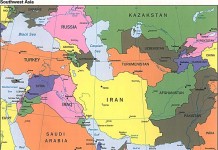Context
 With the use of chemical weapons in Syria last week leading to the tragic death of more than 1300 people, the next stage of the crisis has arrived in earnest. When US Secretary of State of John Kerry spoke on Monday, he left little doubt about where things are heading. From the perspective of the US and the West, the question now is not who to blame, but what to do next.
With the use of chemical weapons in Syria last week leading to the tragic death of more than 1300 people, the next stage of the crisis has arrived in earnest. When US Secretary of State of John Kerry spoke on Monday, he left little doubt about where things are heading. From the perspective of the US and the West, the question now is not who to blame, but what to do next.
The next steps involve sorting out the following:
– Building a representative alliance that involves western nations and regional countries.
– Using the appropriate military tactics and weapons to achieve the objective.
– Defining what the goal really is.
– Assessing the possible reaction to the military strikes.
Of all these, the most challenging aspects relate to ascertaining the goal. It would not be very difficult to build an alliance; US will most likely depend on NATO to spearhead the efforts, with UK and France in the lead, while by passing the UN Security Council. The hardest part is to figure out the immediate and long-tern goals of this intervention.
Similarly, the targeting of the chemical weapons stockpiles will not be that hard. The challenge in this respect is, it would be quite impossible to eliminate all of them without ground intervention. Eliminating the chemical weapons would ultimately require ground troops, for which little appetite exists in the West.
US/NATO would have relied on the Free Syrian Army (FSA) for this purpose. However, the risk is some of these weapons could slip to Al Qaeda or Hezbollah linked extremist groups involved in the fighting there.
Consider this scenario. Realizing that a military strike is imminent, Assad regime could supply some of the chemical weapons to Hezbollah, which can then use them against Israel, widening the theater of war. Israeli forces have already struck in side Syria a number of times to mitigate this risk. If this happens, Israel in all likelihood will strike Iran.
On the other hand, it is well known that FSA has been fighting along side some of the extremist groups, although they recently have claimed to be distancing themselves from these factions. Some infighting between FSA and AQ linked groups has also been reported. However, the fears remain that some of these weapons may ultimately slip to these extremist factions.
Thus, the US/NATO strategy would not only be to target the chemical weapon stockpiles in the first phase of military action, but also the radical groups operating in Syria. The trouble again is: if all the extremists could have been eliminated using the air power alone, war on terror would have been won a long time ago.
The outcome of a limited military action could produce more confusion and chaos, and would raise further questions about what the intensions really are. The objective of regime change in Syria is not as easy as it was in the case of Iraq and Libya, where the regime did not have non-state actors to rely on, where the battle lines were not so pronounced between the Shias and Sunnis, and the Russian and Iranian opposition was not as strong.
In short, any limited military strike will not work without planning the actions that would follow, which no body seems prepared or willing to deal with at this time, but have to nonetheless.



